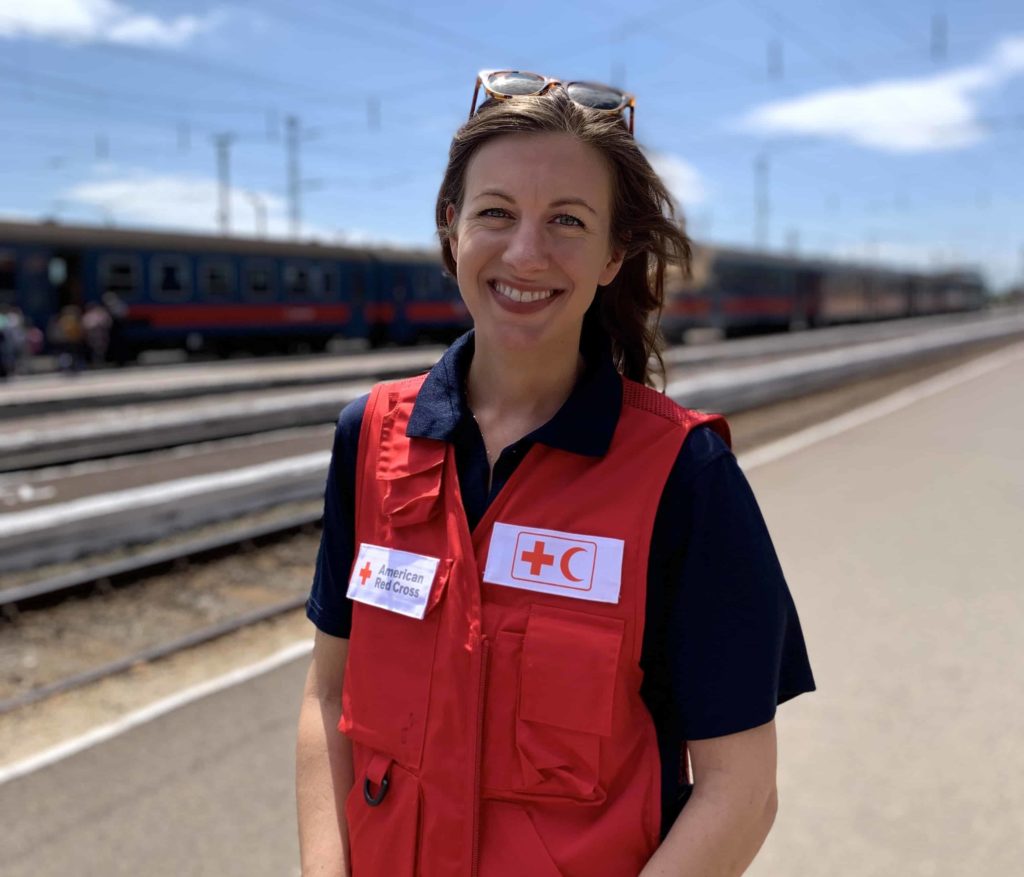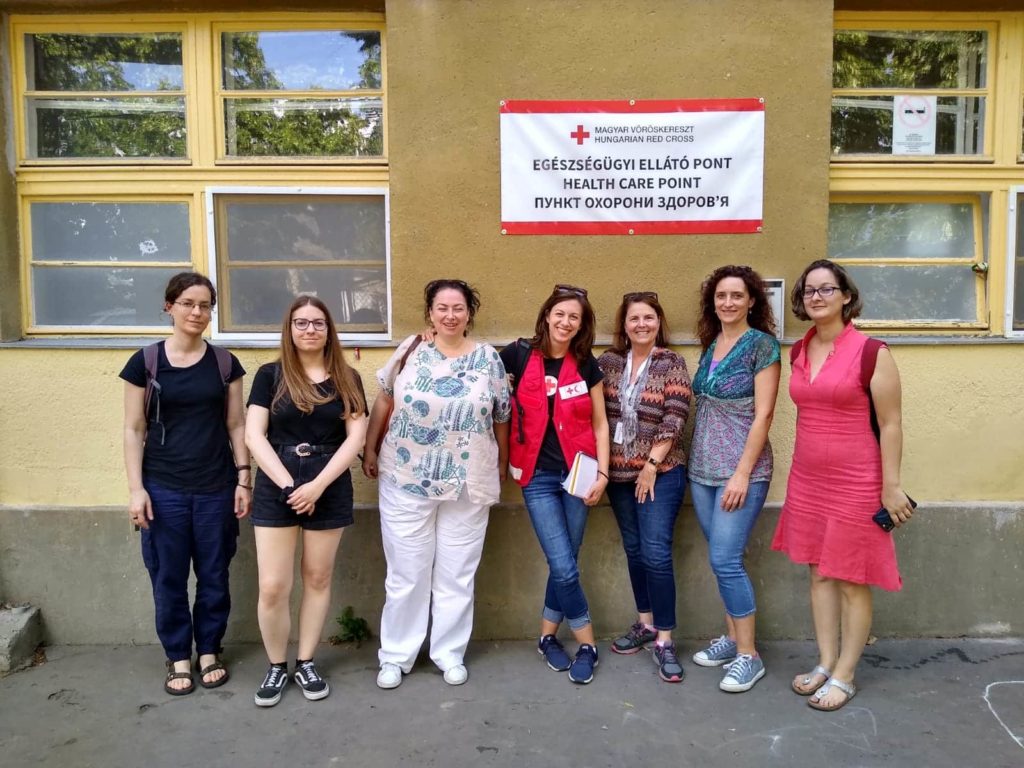
In response to the Ukraine crisis, Katie Wilkes deployed to Europe as a Communications Crisis Responder on behalf of the International Federation of the Red Cross (IFRC). She is one of 28 international crisis responders from the American Red Cross who have deployed to Poland, Moldova, Hungary and Romania to support the ongoing humanitarian crisis.
Katie, who is currently working in Hungary, coordinates communications for Ukraine and the seven neighboring countries where thousands of Red Cross responders are helping those in need. Here, she shares one of her journal entries of what a typical day looks like for her as a Communications Crisis Responder.
6:15 a.m. Alarm goes off, shower time! Quick morning yoga stretch and personal journal session. The consistency of a morning routine helps ground me for what is nearly always an unpredictable day ahead — so does breakfast in my belly.
7:00 a.m. I scan the morning headlines of CNN, The New York Times and the BBC which helps me understand where we can lend our voice through the media. I see The New York Times has a big story on mental health needs in Ukraine — an area we, as the Red Cross, are helping too.
8:00 a.m. I arrive at the office where we gather for an all-team member “stand-up” meeting. We hear updates from the Operations team that the new clinic in Ukraine is opening this week. The Information Management team shares that refugees in Poland are struggling to get jobs — a topic that could be interesting for us to speak about at this week’s United Nations press briefing the IFRC attends.

9:30 a.m. I text a BBC Health producer I know to see if she’s interested in an interview with our health expert to talk about mental health needs of those impacted by the crisis. She’s in! We line up an interview for tomorrow morning.
10:30 a.m. Hot off the presses: The IFRC communications team in Ukraine sends me new video footage of the clinic being set up. I distribute it to our 192 national societies around the globe that can use this for their own local stories, donor reports and media pitching.
11:00 a.m. I grab sandwiches for my team as we hit the road on our way to the border of Hungary and Ukraine. I sit next to Ana, a member of the Spanish Red Cross health team who has been essential in helping the Hungarian Red Cross set up relief centers here. She’s got a fascinating personal story — I make a mental note to write a blog post with her this week.
1:30 p.m. We arrive at the train station in Zahony, Hungary. Thousands of people fleeing Ukraine have passed through here. I film a behind-the-scenes tour of a clinic with Ana for our social media channels and meet a local volunteer who beams with pride. Another compelling story — and don’t forget those photo release forms!
View this post on Instagram
3:00 p.m. I host a live Twitter session from the train station to show how the Red Cross is helping. We love answering questions from the public in real-time.
Join us! https://t.co/lnnyC1xxw9
— Katie Wilkes (@kwilkes1) June 23, 2022
3:45 p.m. I interview a mother and her two young sons at a local Red Cross-run shelter down the road and interview them about what it’s like being so far from home. They show me their favorite dog back home named Adel — the same breed as my own pup. We share a moment of having something in common. I get shivers down my spine and am reminded that we are always more alike than unalike, no matter how divided our world may seem.
“I mostly let him win,” Artim told me with a small grin when his little brother wasn’t looking.” In Hungary for a hockey tournament shortly before the #Ukraine conflict escalated, they’re still unable to return home to Kyiv. That doesn’t stop them from playing. ? @IFRC_Europe pic.twitter.com/sGCO5uyPGs
— Katie Wilkes (@kwilkes1) June 17, 2022
4:00 p.m. Time to head back to the office. Ping! I get a text from our Head of Operations with brand new information about how our teams are helping in Romania. I fire up my WiFi hotspot, whip out my laptop and update our talking points from the backseat, which go out to national society communication team members around the globe.
4:45 p.m. Ping! Another text, this time from a London newspaper reporter asking why the Red Cross isn’t moving faster to help people. I respond by sharing all the locations we are working in and how we are helping, along with brand new photos from the field. She thanks me, unaware of that information. I alert my communications team to focus on sharing more stories from these communities publicly this week.
Millions of Ukrainians have fled to neighboring countries & needs are shifting.
The IFRC has been key in scaling up humanitarian assistance to people in Ukraine & neighboring countries.
Hear more from @kwilkes1.
Thanks @EWScrippsCo for amplifying voices on the ground. pic.twitter.com/8Zu1ZllaXs
— IFRC (@ifrc) June 24, 2022
6:30 p.m. I write down details from the day I don’t want to forget, knowing I can use this information for photo captions, web stories and media pitches the rest of the week.
7:30 p.m. I crash in my room for a simple, quiet dinner alone to recharge before getting ready for another big day ahead.
American Red Cross Crisis responders like Katie are working shoulder to shoulder with international Red Cross teams to aid those impacted by the Ukraine crisis. Delegates lend skills such as crisis leadership, information management, cash assistance programming, GIS systems and communications. To learn more about the Red Cross’ global response, click here.
